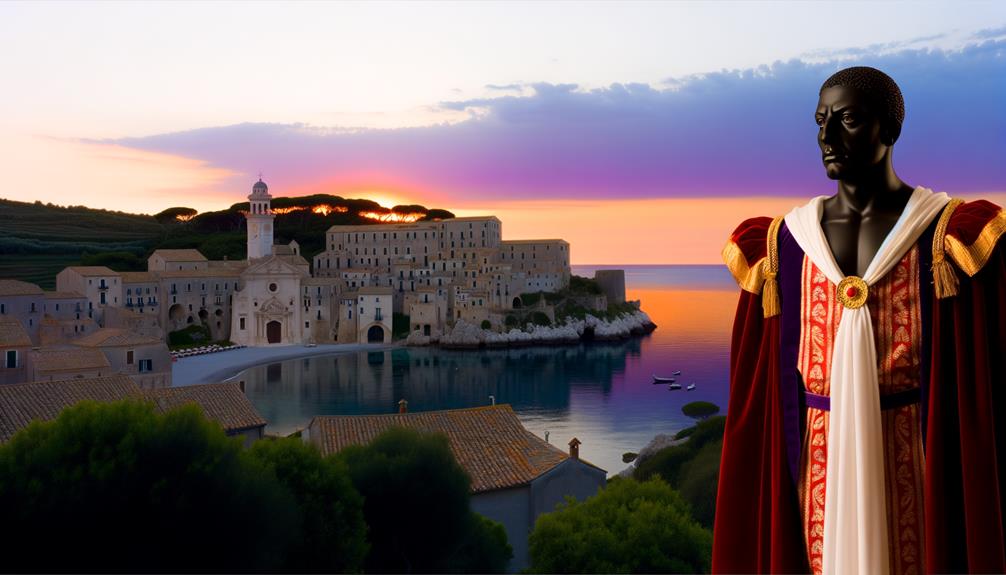Meaning of the Name Alessandro
The name Alessandro, derived from the Greek name Alexandros, translates to 'defender of man.' Composed of 'alexein' (to defend) and 'aner' (man), it showcases ancient Greek linguistic roots and cultural significance. Historically borne by figures such as Alessandro Volta and Alessandro Farnese, the name denotes attributes of protection, leadership, and power.
Its historical and cultural resonance pervades Italian heritage and extends globally. Common variations include Alexander, Alejandro, and Alexandre.
Affectionately shortened to Sandro or Alex, Alessandro is a name deeply interwoven with layers of historical and cultural relevance, offering much more to explore.

Key Takeaways
- Alessandro is derived from the Greek name Alexandros, meaning 'defender of man.'
- The name combines the Greek words 'alexein' (to defend) and 'aner' (man).
- It reflects cultural and linguistic influences from ancient Greece.
- Alessandro is a popular name in Italian-speaking regions.
- Symbolizes strength, leadership, and protection across cultures.
Etymology and Origin
The name Alessandro is derived from the Greek name Alexandros, which is composed of the elements 'alexein,' meaning 'to defend,' and 'aner,' meaning 'man.' This etymology underscores a composite meaning of 'defender of man,' which is both robust and evocative.
The name's Greek origin reflects the linguistic and cultural influences of ancient Greece, where names commonly held significant meanings. 'Alexein' implies an active role in protection, while 'aner' signifies humanity, consequently collectively suggesting a figure who safeguards others.
The evolution from Alexandros to Alessandro demonstrates linguistic progression, adapting to phonetic and cultural contexts, particularly in Italian-speaking regions. This analytical exploration into the etymology reveals the depth and enduring appeal encapsulated in the name Alessandro.
Historical Background
Tracing its historical roots, Alessandro has been borne by numerous influential figures throughout history, reflecting its longstanding presence and significance in various cultural and societal contexts.
One notable figure is Alessandro Volta, the pioneering Italian physicist whose name is immortalized in the unit of electric potential, the volt.
Another prominent bearer is Alessandro Farnese, who became Pope Paul III in the 16th century and played a pivotal role in the Counter-Reformation. The name's prevalence among Italian nobility and clergy underscores its historical depth.
Additionally, Alessandro de' Medici, the first Duke of Florence, signifies its association with political power. These examples illustrate how Alessandro has been interwoven with pivotal historical events and personages, enriching its narrative through centuries.
Meaning and Significance
Rooted in a rich historical tapestry, the name Alessandro carries profound meaning and significance, symbolizing nobility, power, and intellectual prowess. Derived from the Greek name Alexandros, it combines 'alexein' (to defend) and 'aner' (man), translating to 'defender of man.' This etymology underscores its association with leadership and protection.
The significance of the name Alessandro can be encapsulated in three key attributes:
- Nobility: Historically linked with royalty and influential figures, reflecting a legacy of prestige.
- Power: Embodied through its connotation of strength and leadership, often associated with warriors and rulers.
- Intellectual Prowess: Suggestive of wisdom and strategic thinking, attributes essential for effective leadership and governance.
These elements collectively contribute to the enduring allure of the name Alessandro.
Cultural Impact
How has the name Alessandro influenced various cultures, and what ways has it manifested in literature, art, and historical narratives?
The name Alessandro, rooted in the Greek 'Alexandros,' meaning 'defender of the people,' has permeated diverse cultural spheres. Prominent in Italian culture, it appears in literary classics, including works by Alessandro Manzoni, whose novels are cornerstones of Italian literature.
Art has seen its share of Alessandros, with artists like Alessandro Botticelli shaping the Renaissance. Historically, the name evokes figures of leadership and valor, aligning with the qualities of its etymological origin.
Across cultures, Alessandro symbolizes strength and protection, reinforcing its resonance in societal and cultural contexts. To conclude, Alessandro's impact is multifaceted, spanning literature, art, and historical significance.
Famous Bearers
The name Alessandro has been borne by numerous individuals who have achieved prominence in various fields, thereby cementing its legacy.
Historically, figures such as the Italian explorer Alessandro Malaspina have contributed to its enduring significance.
In contemporary culture, the name is embraced by celebrities and has been immortalized in literature, reflecting its broad and lasting appeal.
Historical Notable Figures
Among the many illustrious individuals named Alessandro, several have left an indelible mark on history through their remarkable contributions to various fields. Their achievements span across science, the arts, and politics, reflecting the diverse impact of this name.
- Alessandro Volta: An eminent physicist, Volta is renowned for his pioneering work in electricity, including the invention of the electric battery, which has been fundamental to modern electrical engineering.
- Alessandro Manzoni: A celebrated writer, Manzoni's novel 'The Betrothed' is a cornerstone of Italian literature, influencing the unification of Italy and shaping its cultural narrative.
- Alessandro Farnese: Known as Pope Paul III, Farnese played an essential role in the Counter-Reformation and the Council of Trent, significantly influencing the Roman Catholic Church's direction.
Modern Celebrities Named Alessandro
Building upon the legacy of historical figures, contemporary celebrities named Alessandro continue to make significant contributions in fields such as entertainment, sports, and fashion.
Alessandro Nivola, an acclaimed actor, has gained recognition for his roles in films like 'American Hustle' and 'The Many Saints of Newark.'
In sports, Alessandro Del Piero, a retired Italian footballer, is celebrated for his illustrious career with Juventus and the Italian national team.
The fashion industry boasts Alessandro Michele, the visionary creative director of Gucci, who has revitalized the brand with his eclectic designs.
Each of these individuals exemplifies how the name Alessandro is associated with excellence and innovation across various professional domains, thereby perpetuating its enduring legacy.
Alessandro in Literature
Renowned authors and poets named Alessandro have left a lasting impact on the literary world, with their works often characterized by profound thematic richness and stylistic innovation. These literary figures have contributed significantly to various genres, enriching the cultural tapestry with their unique perspectives.
Notable Alessandros in literature include:
- Alessandro Manzoni – His historical novel 'The Betrothed' is considered a masterpiece of Italian literature, intertwining personal and socio-political themes.
- Alessandro Baricco – Known for his lyrical prose, Baricco's 'Silk' captures the essence of human emotion and cultural interplay.
- Alessandro Piperno – A contemporary voice, Piperno's works, such as 'Persecution,' explore complex psychological and moral landscapes.
These authors exemplify the powerful influence of the name Alessandro in literature.
Popularity Over Time
The popularity of the name Alessandro has experienced notable fluctuations over the decades, reflecting broader cultural and societal trends. Initially more prevalent in Italian-speaking regions, Alessandro gained wider recognition in the late 20th and early 21st centuries, perhaps influenced by increased global interconnectedness and the rise of cultural exchange.
Data from national registries indicate a steady climb in usage in countries outside Italy, such as the United States and Brazil. Peaks in popularity often coincide with the visibility of notable individuals bearing the name, such as athletes, artists, or public figures. Conversely, the name's usage occasionally declines during periods when shorter, more modern names gain favor, illustrating the cyclical nature of naming conventions.
Variations and Nicknames
Alessandro, a name rich in cultural history, has several variations and nicknames that have emerged across different languages and regions, reflecting its adaptability and enduring appeal.
These variations and diminutives not only highlight the name's linguistic flexibility but also its global resonance.
- Variations: The name translates differently in various languages, such as Alexander in English, Alejandro in Spanish, and Alexandre in French, each maintaining the original meaning of 'defender of the people.'
- Nicknames: Common affectionate forms include Sandro in Italian, Alex which is universally recognizable, and Ale, a casual and endearing option.
- Regional Adaptations: In Slavic regions, the name morphs into Aleksandr or Sasha, demonstrating its integration into diverse cultural contexts.
This multifaceted adaptability underscores Alessandro's timeless allure.
Modern Usage
In contemporary society, the name Alessandro has maintained its relevance and appeal across various cultures and generations. Rooted in Italian and Greek origins, Alessandro continues to be favored due to its classical charm and modern versatility. Its phonetic elegance and strong historical associations with figures such as Alexander the Great underscore its timeless nature.
This name's adaptability is evident as it seamlessly integrates into diverse cultural contexts, from Europe to Latin America. Additionally, Alessandro's capacity to generate appealing nicknames like Alex, Sandro, and Ale enhances its accessibility and familiarity. Its enduring popularity also benefits from notable contemporary bearers, including athletes and artists, thereby reinforcing its modern appeal and ensuring its persistent relevance across generational lines.
Conclusion
To wrap up, the name Alessandro, originating from ancient Greek, signifies 'protector of humanity' and showcases a deep historical and cultural legacy.
Importantly, in Italy, Alessandro has continuously been a popular choice within the top 50 male names for years, demonstrating its lasting appeal.
This name's influence is further highlighted by many well-known individuals in different domains, emphasizing its broad popularity and importance throughout diverse cultures and periods.
The name's adaptability in contemporary usage continues to uphold its classic principles.






